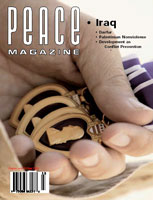
Peace Magazine Oct-Dec 2004, page 10. Some rights reserved.
Search for other articles by Eric Walberg here
Good news for Central Asia
At a June meeting of military officials from European and Shanghai Cooperation Organization countries, Uzbekistan announced its commitment to demining its borders with Kirgizstan and Tajikistan. There have been close to 100 Uzbek, Kirgiz, and Tajik deaths from mines in the past four years, according to Tajik authorities (no official figures are tallied), not including the deaths of sheep and cows, in areas that have been legal borders only in recent times and were traditionally grazing areas. The Uzbek government has never actually acknowledged that it planted mines on its borders four to six years ago when the threat of Islamic insurgents was more urgent, so the decision to demine is also an admission that mines were used. As Uzbekistan was the only country laying the mines on its borders, it created ill will and negative publicity. The announcement boosts Uzbekistan's image, which is now controversial because of human rights concerns.
In Central Asia, only Tajikistan and Turkmenistan have joined the 152 nations that have signed the Ottawa convention (Estonia was the most recent, signing in May 2004), and so far Uzbekistan has not indicated that it is ready to sign. Still, this move is an important step in a region characterized more by political tensions and environmental and security worries than moves towards peace.
In an interview with Peace Magazine, Sandra Rossiter, second secretary of the Canadian Embassy in Moscow, which also is responsible for relations with Uzbekistan, explained that Canada is encouraging Uzbekistan to adopt a stance leading to accession to the Ottawa Convention. She said, "DND has in the past provided technical expertise in demining and stockpile destruction."
The Canadian Landmine Fund is the Canadian government's primary vehicle for action. As Rossiter explained, CIDA funds projects in mine risk education, humanitarian demining, and victim assistance. Foreign Affairs Canada (FAC) advocates for adoption of the Convention, and assists countries in destroying their stockpiles of mines and in humanitarian demining. The emphasis is on developing indigenous capacity of countries to demine themselves, educate their people, and care for victims, families and communities. Canada has recently signed a Military Training Assistance Program arrangement with Uzbekistan. Such programs assist developing regions in language training, professional development and peacekeeping training.
Eric Walberg is a Canadian interpreter in Tashkent.

Peace Magazine Oct-Dec 2004, page 10. Some rights reserved.
Search for other articles by Eric Walberg here